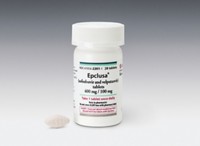Advertisement
Grab your lab coat. Let's get started
Welcome!
Welcome!
Create an account below to get 6 C&EN articles per month, receive newsletters and more - all free.
It seems this is your first time logging in online. Please enter the following information to continue.
As an ACS member you automatically get access to this site. All we need is few more details to create your reading experience.
Not you? Sign in with a different account.
Not you? Sign in with a different account.
ERROR 1
ERROR 1
ERROR 2
ERROR 2
ERROR 2
ERROR 2
ERROR 2
Password and Confirm password must match.
If you have an ACS member number, please enter it here so we can link this account to your membership. (optional)
ERROR 2
ACS values your privacy. By submitting your information, you are gaining access to C&EN and subscribing to our weekly newsletter. We use the information you provide to make your reading experience better, and we will never sell your data to third party members.
Pharmaceuticals
Gilead to launch authorized generics of two HCV drugs
The goal is to remain competitive while lowering the cost for patients
by Lisa M. Jarvis
September 26, 2018
| A version of this story appeared in
Volume 96, Issue 39

Starting early next year, Gilead Sciences will sell cheaper generic versions of two of its hepatitis C virus drugs, Harvoni and Epclusa. Introduction of the “authorized” generics is an effort to remain competitive in the cutthroat HCV market while also helping consumers capture some of the discounts given to insurers.
To be launched through a new subsidiary, Asegua Therapeutics, the authorized generics are meant to close the gap between the eye-poppingly high list prices for the drugs and the net price—what insurers actually pay for them. In the case of Harvoni and Epclusa, which carry list prices of $94,500 and $75,000, respectively, the $24,000 price tag for a course of treatment with the generics is roughly equal to the net price paid by many insurers.
The effect on costs for patients and overall spending remains to be seen. “It’s unlikely this will result in lower government spending because this is what governments were approximately paying already,” says Rachel Sachs, a professor and innovation policy expert at Washington University School of Law.
Although Medicaid patients, who have little or no cost sharing with their insurer, will not see a difference at the pharmacy, people with Medicare Part D, who have high cost-sharing, could see their out-of-pocket costs go down—Gilead believes by as much as $2,500 per patient.
Sachs says the strategy could also increase access for patients in correctional facilities. Although prisoners represent a sizable slice of the HCV patient population, correctional facilities have not been able to negotiate the kind of steep discounts given to Medicaid and Medicare.
For Gilead, the effort could help sustain a struggling franchise. After the firm’s late 2013 launch of Sovaldi, an antiviral that later became the backbone for the combination therapies Harvoni, Epclusa, and Vosevi, Gilead saw a meteoric rise in HCV drug sales, to $19.1 billion in 2015. But as patients were cured and cheaper drugs were introduced, the company saw an equally swift descent. By 2017, Gilead’s HCV drug sales were down to $9.1 billion.
AbbVie’s Mavyret, introduced in mid-2017 with a list price of just $26,400, is one of the cheaper drugs. Mavyret has seen particularly swift uptake among Medicaid recipients, according to Evercore ISI analyst Umer Raffat. Although a generic Epclusa could help Gilead in that segment, “I doubt Gilead can make a move like this and competitors won’t respond,” Raffat said in a note to investors. “It’s possible that this starts another round of pricing flux in this market.”




Join the conversation
Contact the reporter
Submit a Letter to the Editor for publication
Engage with us on Twitter